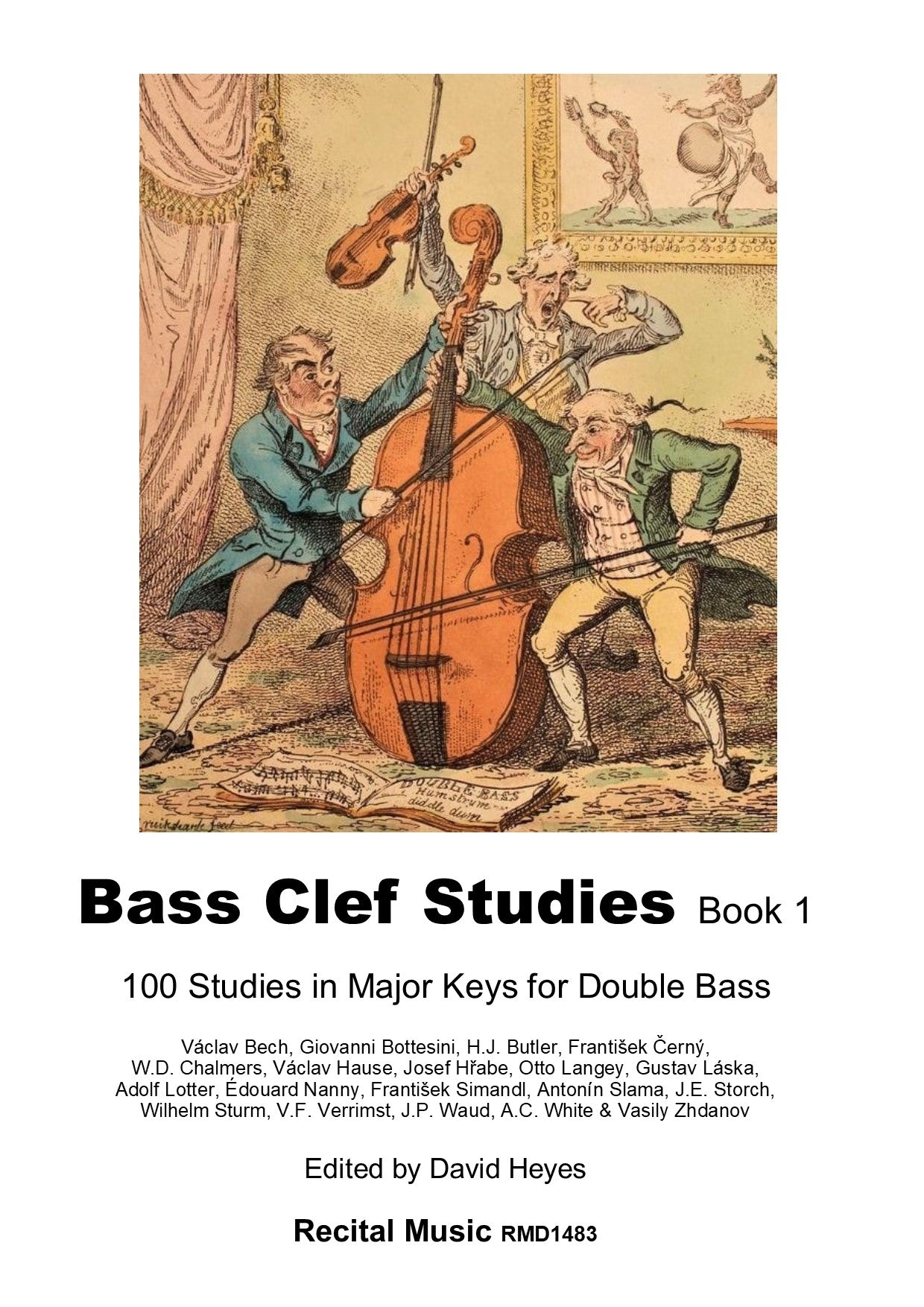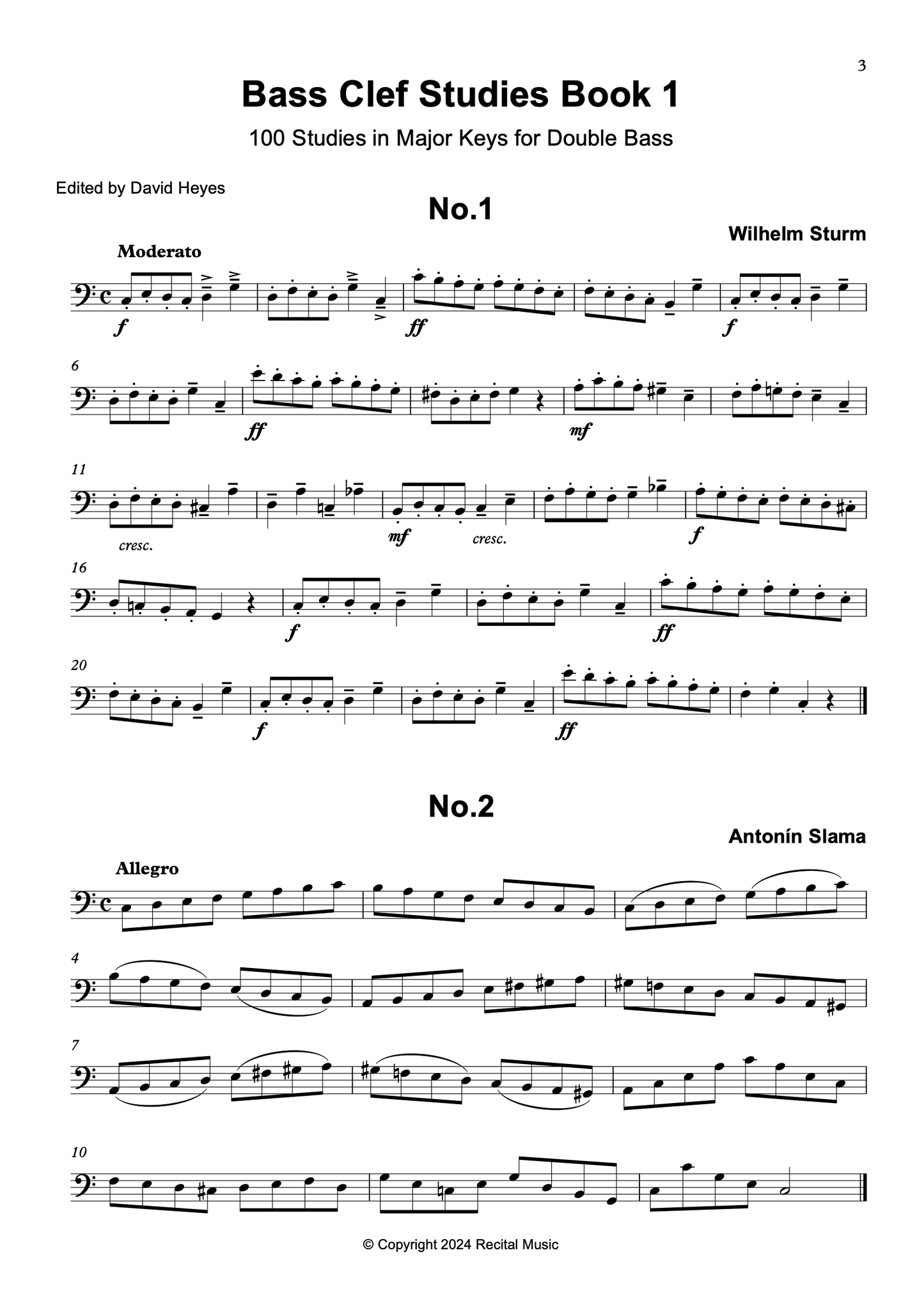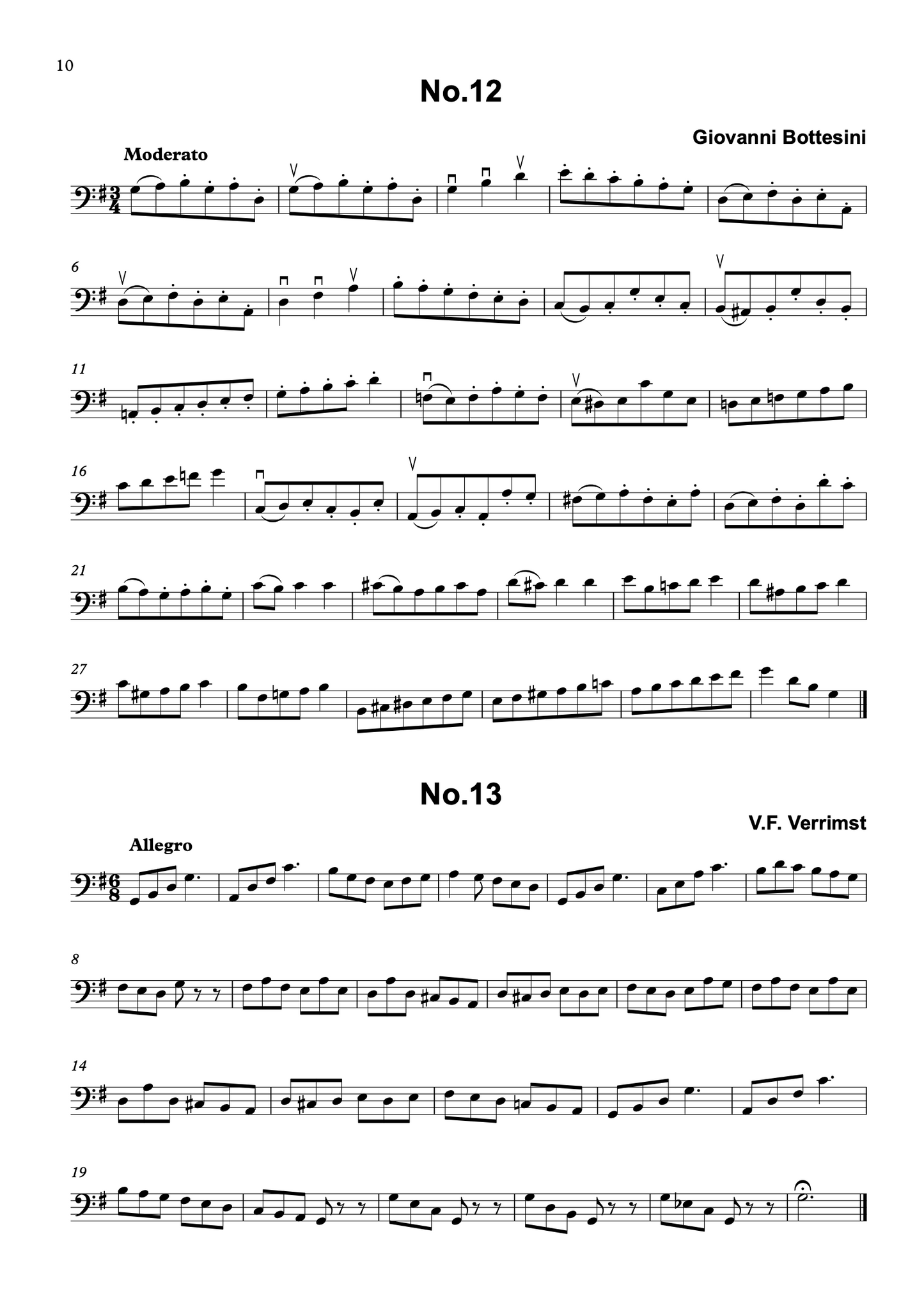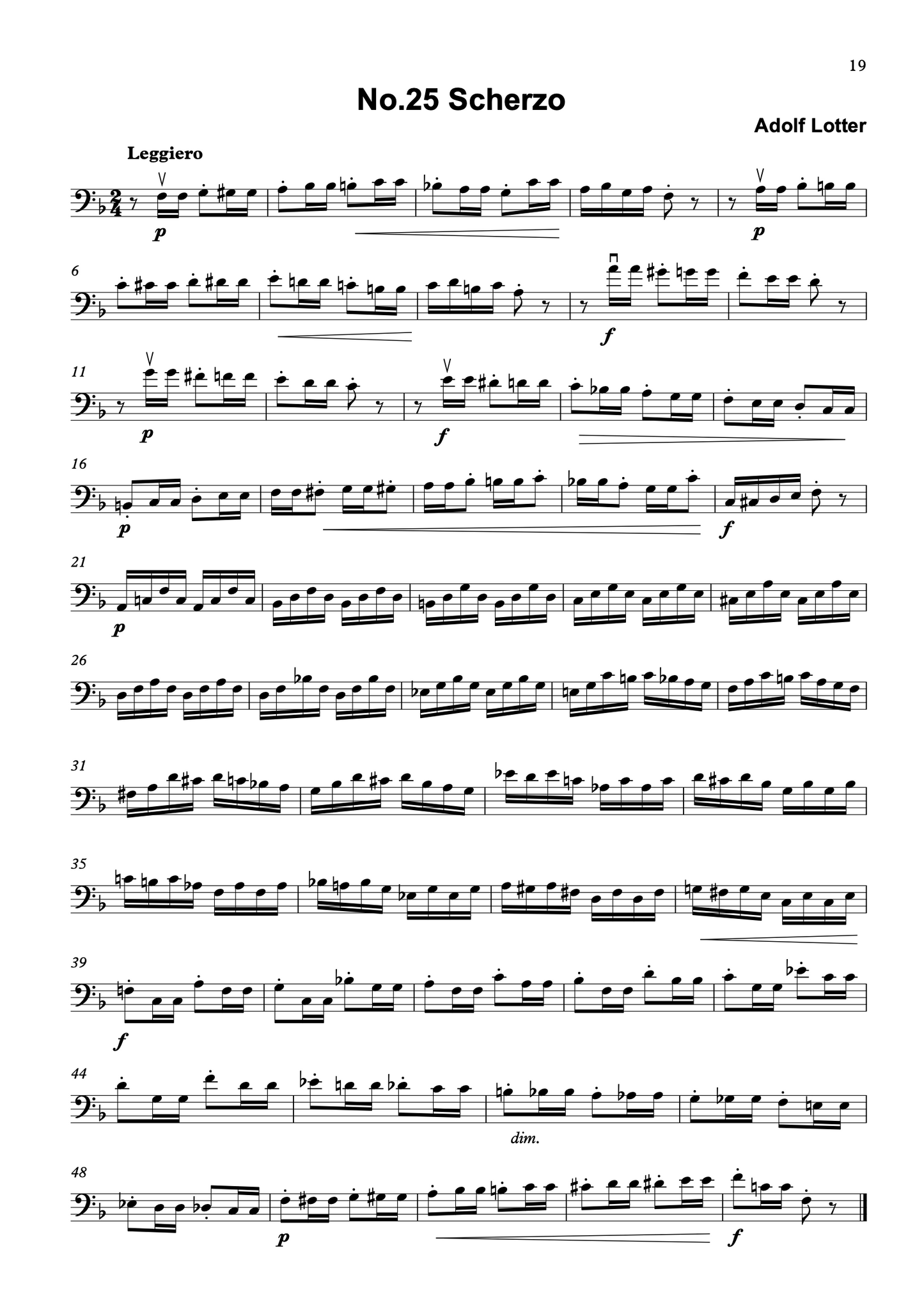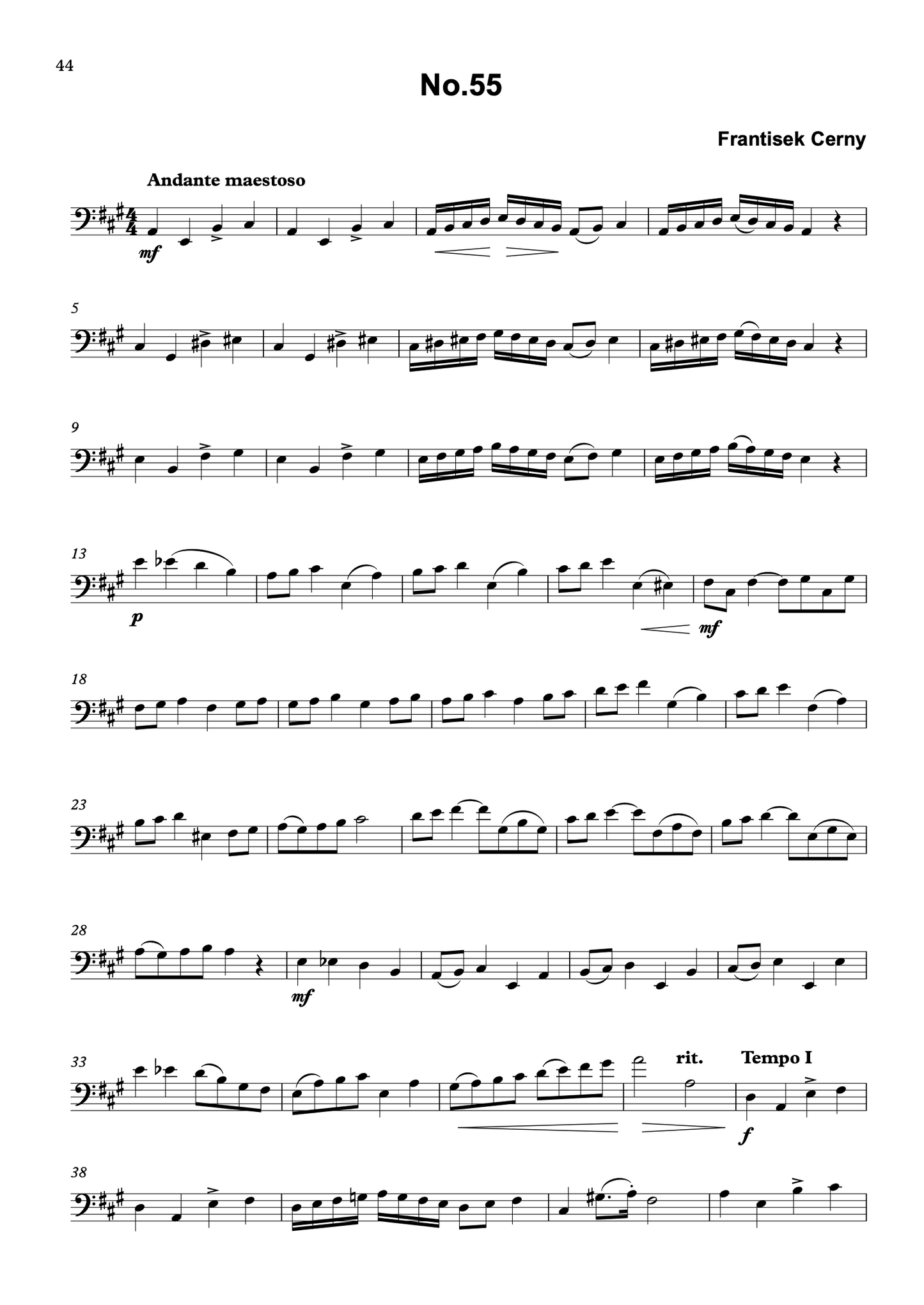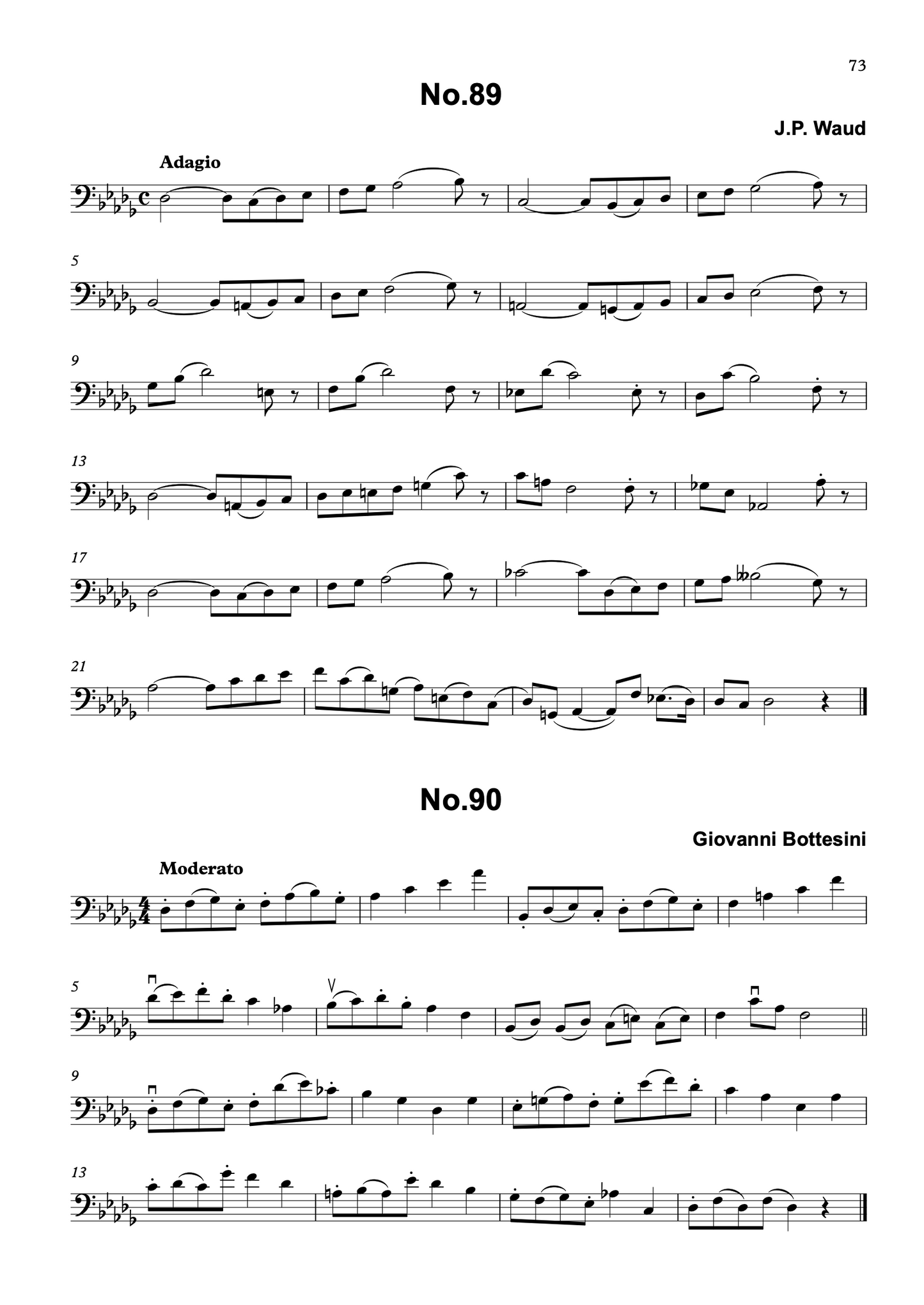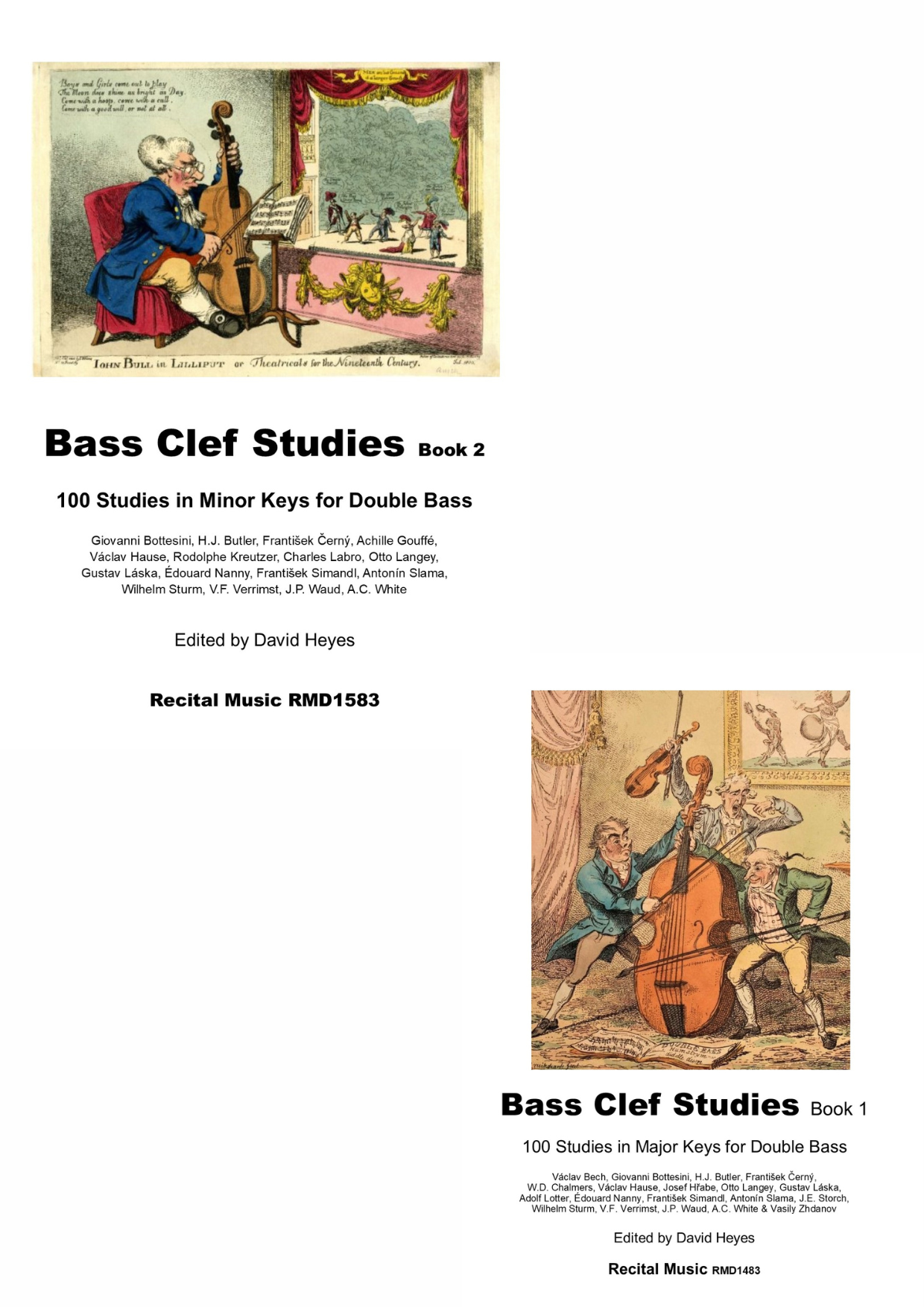David Heyes
Bass Clef Studies Book 1 - 100 Studies in Major Keys for Double Bass (ed. Heyes)
Bass Clef Studies Book 1 - 100 Studies in Major Keys for Double Bass (ed. Heyes)
Couldn't load pickup availability
About the Studies
Studies and etudes are an important aspect of learning to play the double bass and many include musical and technical challenges in equal measure. Over the past 200 years’ influential teachers have written methods, alongside books of studies, enabling students to benefit from their knowledge and successful teaching careers.
Bass Clef Studies Book 1 brings together 100 studies in major keys by leading double bass pedagogues from the 19th and early 20th-century. Bassist-composers from seven countries (Czech Republic, France, Germany, Italy, Russia, UK, USA) are featured, encompassing a wealth of musical styles and with studies ideally suited for a wide range of ability levels.
Different bowings, articulations and dynamics can be added to create new challenges and the possibilities are endless. The studies are useful to build and consolidate technical skills throughout the bass clef register of the double bass and could also be used as sight-reading practice. The addition of studying scales and arpeggios in each major key will help to create a confident knowledge of the geography of the fingerboard.
Book 1 includes 100 studies in major keys, and Book 2 is devoted to minor keys.
What You Recieve
The Cover Art, Description, and Studies book is delivered in PDF format and is 84 pages long.
Table of Contents
1. C major - Studies 1-10 (Sturm, Slama, Waud, Bech, Butler, Bottesini, Simandl, Chalmers, Langey, Láska)
2. G major - Studies 11-20 (Waud, Bottesini, Verrimst, Černý, Nanny, Sturm, Bech, Lotter, Zhdanov, Hause)
3. F major - Studies 21-30 (Slama, Waud, Bottesini, Butler, Lotter, Hrabě/Butler, Chalmers, Zhdanov, Storch, Černý)
4. D major - Studies 31-40 (Bottesini, Bech, Sturm, Hause, Lotter, Waud, Butler, Nanny, Simandl, Slama)
5. B flat major - Studies 41-50 (Butler, Waud, Verrimst, Bottesini, Bech, Chalmers, Slama, Hause, Storch, Lotter)
6. A major - Studies 51-58 (Verrimst, Simandl, Bottesini, Zhdanov, Černý, Hause, Lotter, Hrabě)
7. E flat major - Studies 59-66 (Butler, Bech, Slama, Bottesini, Nanny, White, Simandl, Waud)
8. E major - Studies 67-73 (Bech, Verrimst, White, Sturm, Bottesini, Černý, Hause)
9. A flat major - Studies 74-80 (Slama, Bottesini, Butler, White, Simandl, Nanny, Lotter)
10. B major - Studies 81-87 (Hause, Butler, Slama, Sturm, White, Bottesini, Simandl)
11. D flat major - Studies 88-94 (Butler, Waud, Bottesini, Černý, Hause, Sturm, Slama)
12. F sharp major - Studies 95-97 (Butler, Slama, Sturm)
13. G flat major - Studies 98-100 (Bottesini, Černý, Lotter)
About the Composers
Václav Bech (1877-1936) was a Czech bassist and studied at Prague Conservatoire with Vendelín Sládek and František Černý. He played in many orchestras and from 1909-1914 taught at the St. Petersburg Conservatoire, and later 1919-1936 taught at the Brno Conservatoire (Czech Republic). Bech composed a method and several books technical study books for the double bass.
Giovanni Bottesini (1821-1889) was the leading double bass soloist of the 19th-century and, so great were his technical skills, that he was nicknamed ‘the Paganini of the double bass’. His original works are at the heart of the solo repertoire to the present day and his Grande méthode complète de contrebasse, published in France c.1869, combines music and technical challenges in equal measure.
Herbert J. Butler (1845-c.1929) studied in Leipzig with Josef Emanuel Storch and was a member of the Boston Symphony Orchestra between 1881-1902 and 1903-1907. His New Progressive Method for the Four Stringed Contra Bass was published in 1881 in Boston by Thompson & Odell and the following year the same company published his 31 Easy Exercises for Contra Bass.
František Černý (1861-1940) studied at Prague Conservatoire and became Principal Bass of the Prague National Theatre Orchestra in 1890. He was an outstanding teacher and taught at Prague Conservatoire for 31 years (1900-1931). He composed a number of works for double bass, including four concertos and ten salon pieces for double bass and piano, alongside a Method and several impressive and important books of studies.
W.D. Chalmers produced a hand copied book of 22 Studies for Contrabass in May 1948, now in the collection of David Heyes, but nothing else is known about him. He may have been a double bass teacher, writing short and accessible studies for his students, or simply was an enthusiastic amateur bassist who had the desire to write a series of studies for the double bass.
Václav Hause (1775-1847) began to study the violin before transferring to the double bass and in 1811 became the first Professor of Double Bass at Prague Conservatoire. He was an excellent performer and teacher, with Josef Hrabě and Antonín Slama being two of his most illustrious students, and his Method ans books of studies for double bass are the foundation of the Czech school of double bass.
Josef Hrabě (1816-1870) was an influential and important Czech bassist and teacher. He studied at Prague Conservatoire, replacing his teacher in 1845, and amongst his most successful students were Gustav Láska, František Simandl and Johann Joseph Abert. Hrabě performed in many orchestras, played also as a soloist, and his 86 Studies for double bass remain popular to the present day.
Otto Langey (1851-1922) was a German-American cellist, composer and editor and worked as a cellist in London (1877-1889) and Boston (1889-1909). From the 1890s he published his series of famous Tutor Books for many instruments, including the three books for the double bass in 1885 (3 string double bass), 1890 (revised for the 4 string double bass) and 1892.
Gustav Láska (1847-1928) studied at Prague Conservatoire (1861-7) with Josef Hrabě, travelled extensively in Europe and America, as both a soloist and orchestral player, and was Principal Double Bass at the Bayreuth Festival for many years. He was a prolific composer, writing in many genres, including three operas, two orchestral overtures, two symphonies, sacred choral works, piano music, and many works for the double bass.
Adolf Lotter (1871-1942) studied double bass with František Černý, and composition with Antonín Dvořák, at Prague Conservatoire. He lived in London from 1894 until his death and quickly established himself as one of the leading bassists of his generation. He was a member of the Queen's Hall Orchestra for over thirty years (1898-1930), becoming Principal Bass in 1911 and also played with the London Symphony Orchestra and for Glyndebourne Opera.He composed and arranged over seventy works for orchestra, military band, string orchestra or piano, mainly in a light and popular style, but few works for the double bass.
Édouard Nanny (1872-1942) was the leading French bassist of his generation, taught at the Paris Conservatoire for 20 years, and is recognised as the founder of the modern French double bass school. Alongside a wealth of transcriptions for double bass, he also composed a series of original works but more importantly produced much educational music, including a Method, and many books of studies which are still in print today.
František Simandl (1840-1912) was an important and influential Czech bassist, composer and teacher and studied at Prague Conservatoire with Josef Hrabě. He was a member of the Vienna Philharmonic Orchestra, also teaching many important bassists at Vienna Conservatoire who subsequently exported the Czech double bass school throughout the world. He composed and transcribed many works for double bass, also commissioning works from leading bassists in Europe, and his Method and books of studies remain in print today.
Antonín Slama (1803-1881) studied trumpet and trombone and double bass at Prague Conservatoire, alongside double bass with Václav Hause, and played with Prague Opera before becoming a member of the Vienna Court Opera Orchestra. From 1839 he became the first Professor of Double Bass at the Vienna Conservatoire and composed a Method for double bass alongside 66 Etudes in all major and minor keys for trombone, also playable on double bass or bassoon.
Josef Emanuel Storch was born in Semily (Czech Republic) in 1841 and between 1855-61 studied double bass at Prague Conservatoire with Josef Hřabe. After graduation he moved to Leipzig where he became a member of the Leipzig Gewandhaus Orchestra and taught at the Music Conservatoire. The Storch-Hřabe studies for double bass, which are still in use today, were probably a collaboration between teacher and pupil, and Storch also composed a number of original works for double bass which have been sadly forgotten and are now mostly out of print. Josef Emanuel Storch died in 1877.
Wilhelm Sturm (1829-1898) was a German double bassist and teacher and taught at the Royal Academic High School in Berlin and is remembered today thanks to his two volumes of 110 Studies for double bass. He also wrote a Practical Double Bass School in 1877 alongside a number of concert pieces for double bass and piano.
Victor Frédéric Verrmist (1825-1893) studied double bass at the Paris Conservatoire with Louis François Chaft and worked as a double bassist at the Opéra-Comique, later the Paris Opera and at the Société des Concerts du Conservatoire. He was Professor of Double Bass at the Paris Conservatoire and composed a number of works for the instrument, including a Methode de Contre-basse a quatre cordes in 1865, alongside Cinq Morceaux de Concours', with piano accompaniment which were probably written for his students at the Conservatoire.
James Pritchard Waud (1833-1905) was a cellist, pianist and double bassist and worked at the Crystal Palace and the Theatre Royal Haymarket in London. His nephew was James Haydn Waud, an eminent London bassist and teacher, and his only composition appears to be his Progressive Tutor for the Double Bass, published by Augener & Co. in the mid-1880s.
Adolphus Charles White (1830-1902) was one of the leading English orchestral double bassists of his day and was Principal Bass of the Italian Opera until 1897, combining his orchestral duties with teaching at the Royal College of Music and Royal Academy of Music in London. In 1890 White was appointed 'Musician in Ordinary' to Her Majesty Queen Victoria and for 22 years was organist at St Philip's Church, Waterloo Place. He composed In teifen Keller for double bass and piano, which is dedicated to Bottesini, and a Music Primer for the 3 string double bass in the 1880s.
Vasily Zhdanov (1845-1910) was a Russian double bassist and teacher. He was a member of the Court Theatre Orchestra in St Petersburg and from 1877 taught at the St Petersburg Conservatoire. He composed a School for Double Bass and also a number of concert works for double bass and piano but his music is almost completely unknown today.
